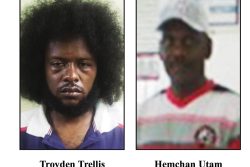Leaving aside the sense of ‘sameness’ with its predecessor, the Ramotar administration has been blighted by the political ill-will that has surfaced out of the People’s Progressive Party/Civic’s loss of control of the National Assembly. It is clear that the ruling party continues to have manifest difficulty coping with the altered parliamentary arrangements resulting from last November’s general elections. It has spent much of its time in office throwing tantrum after tantrum over the opposition’s one-seat majority, its most recent outburst coming in the form of a thinly veiled threat from Cabinet Secretary Roger Luncheon about the government neutralizing that parliamentary majority. The PPP/C, it seems, is decidedly intolerant of this particular face of democratic politics.
True, a year is a relatively short time in politics. That, however, does not gainsay the fact that the Ramotar administration still appears to derive such momentum as it has mustered from its predecessor’s slipstream, having accomplished little if anything of its own in the key areas of economic, social or foreign policy. That seeming dependency – at least for the time being – on what the PPP/C’s supporters perceive as the accomplishments of the Jagdeo regime is probably not as wholesome for Mr. Ramotar’s own presidential image as his supporters might think. Failure to secure a worthwhile credential of its own has had other perhaps unintended consequences for the Ramotar administration not least of which has been the creation of the impression of a seamless transfer of presidential office (rather than power) attended by no substantive or meaningful shift in either the style or the substance of leadership.
Little wonder that critics of the Ramotar administration have not troubled themselves to determine whether the scourges of crime and corruption that were so prevalent under Mr. Jagdeo’s government exist in comparable measure under Mr. Ramotar’s presidency. The new administration has had to continue to carry the can for much of the ills of its predecessor purely because it has provided no evidence of either the clout or the will to do anything differently.
What Mr. Ramotar will, hopefully, come to understand before too much more time elapses, is that unless he lays down his own presidential marker he cannot expect to secure the credentials that will distinguish his presidency from his predecessor’s. Those can only be earned by providing public evidence of a personal style and substance and realizing solid accomplishments to which he can lay unchallengeable claim when he arrives at that juncture where legacy is an issue. Until the nation becomes more familiar with both the style and the goals of the Ramotar administration, it will continue to be perceived as a political enigma as, most assuredly, will the President himself.
In the final analysis the onus is on the President himself to correct the prevailing unflattering perceptions of both his presidency and his administration. Mr. Ramotar may never realize the iconic status which his predecessor secured from members and supporters of the PPP by the end of his tenure. That having been said one assumes that Mr. Ramotar’s not particularly appealing image as one of the remaining members of the PPP’ ‘old guard’ does not mean that he has no ambitions or goals of his own as President .of the Republic. The problem is that in the absence of a clearly recognizable leadership style and accompanying strong policy positions on critical national issues (and, frankly, little evidence of these have been forthcoming from Mr. Ramotar since his election to office) Donald Ramotar is likely to be seen much more as the man whom the PPP leadership chose to succeed Jagdeo than a President elected to govern the country by the largest single slice of the electorate. Whatever his loyalties to the ruling party he surely cannot be satisfied with a public persona that characterizes him as no more than a loyal party man. Here, he can learn a great deal from Mr. Jagdeo.








